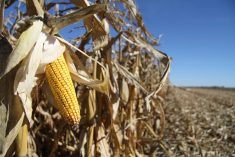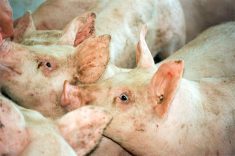DOMAIN, Man. – Farmers never like admitting they had a great crop and
will make a big profit.
Perhaps it’s a prairie modesty that holds farmers back.
Perhaps it’s a fear that government support for agriculture will weaken
even more if some farmers admit to doing well.
Or perhaps it’s the nagging guilt of prospering when other farmers are
having troubles. That understanding, combined with the knowledge that
for prices to go up, someone has to have a crop failure, is perhaps
Read Also

Bond market seen as crop price threat
A grain market analyst believes the bond market is about to collapse and that could drive down commodity values.
enough to stifle farmers’ tongues.
That’s evident this year. Between the drought affecting thousands of
farmers and the severe crop quality downgrades affecting thousands of
others, some farmers and farming areas will get some of their best
returns ever.
“We had a good crop,” said Domain, Man., farmer Bob Wiens as he
finished harvesting his last field of standing crop in the first week
of October.
“We didn’t expect much but we were very surprised.”
With today’s prices, his 45 bushels per acre of wheat, 33 of canola, 33
of flax and 90 of oats will bring him a tidy return. His canaryseed
field, which he was harvesting this sunny day, was a disaster, with
almost nothing in the heads. But the rest of his harvest has been
excellent.
“It’s not a bumper crop, but with today’s prices, that’s OK,” said
Wiens.
His neighbour, Stuart Manness, also had an excellent harvest, which
gives him an honest sense of thanksgiving.
“We’re very grateful and delighted,” said Manness.
That mood is shared in an area near Yellow Grass, Sask., which also
produced good crops that will be sold at great prices.
“We were blessed in here,” said Yellow Grass farmer Richard Erb.
“We’re in a unique situation in my experience. Not only do we have a
good crop, but we have good prices.”
Neighbour Lorne McClinton is slowly coming to terms with his good
fortune.
“I’m confident this will be the best year I’ve ever had,” said
McClinton, whose wheat yielded 40 bu. per acre, as did his durum. The
Laird lentils yielded 25, oats 110, flax 27 and field peas Ð the only
disappointment Ð 25.
“We’ve just started calculating the values, and my mouth just dropped.”
McClinton, Erb, Manness and Wiens sound sheepish about their situation
this autumn, as if they got away with something they shouldn’t have.
That sense comes from facing some of the same bad weather other farmers
had, but fortunately having it clear at just the right times.
“Some of this land was under water for a week in June,” said Wiens. “I
thought there’d be nothing.”
A heat wave also came through, but apart from being the likely culprit
for the bad canaryseed, the blast seemed to leave the rest of the crops
alone, including the usually sensitive canola.
Erb said farmers in his area also faced wet weather at harvest time,
but they had a one-week rain-free spell that saved this year’s crop.
There was some downgrading, but it was still a good yield.
“The farmers got busy and put it in the bin,” said Erb. “Most farmers
didn’t get that window.”
Added Wiens: “We don’t want to gloat. We know there are people doing
badly.
“My cousin near Saskatoon didn’t take his combine out of his shed,”
Said Manness: “I have mixed feelings about an industry in which for me
to do well, someone else has to suffer.”
But their guilty feelings are assuaged by the knowledge that they
shared some of their fortune this year. Manness, Wiens and a few other
local farmers rent a quarter section every year that they use to
produce a crop to donate to the Canada Foodgrains Bank.
This year, the field of canola they produced will allow them to donate
about $30,000 to the foodgrains bank.
“I get some solace from that,” said Manness. “Somewhere in the world,
someone will benefit.”
“We do it as Christians,” Wiens said.
“We’re privileged to live in Western Canada and we’re privileged for
our fortune.”
All four farmers say this year’s good crop makes up for losses in
previous years, so their excitement is tempered.
“We’ve been in a back spiral here for a few years,” said Erb, whose
area has had problems with excessive moisture and where low commodity
prices have weakened many farms.
Wiens said his area has had excessive moisture in six of the last 10
years, so this year’s crop makes up for some of those losses. But none
downplay the good fortune they are experiencing today.
“Here we are, sitting with our bins full, prices are great, but prices
are great because some of our neighbours don’t have a crop,” said Erb.
“This is a unique year for us.”
McClinton said he has been toying with the idea of quitting farming
after making such a windfall, though he doubts he’ll actually do it.
“You feel like you’ve been down all night at the blackjack table and
you’ve suddenly broken even,” said McClinton.
“You wonder if you should just cash out and walk away while you
actually have something.”
















